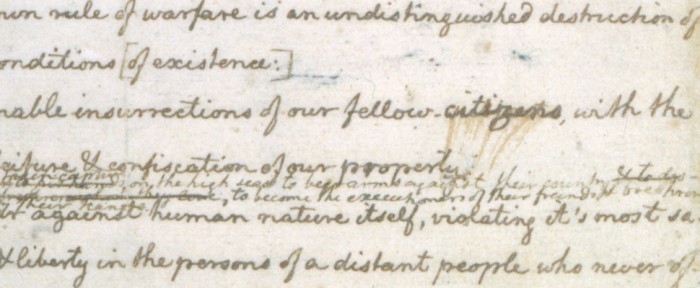Hyperspectral images of a draft of the Declaration of Independence reveal that it originally used the word ‘subjects’ instead of ‘citizens’ at a critical juncture. After writing “our fellow subjects,” author Thomas Jefferson scrubbed it out and replaced it with the familiar alternative.
To the Library of Congress, whose Preservation Research and Testing Division analyzed the document with the latest high-resolution camera equipment, it illustrates an important moment: “when [Jefferson] reconsidered his choice of words and articulated the recognition that the people of the fledgling United States of America were no longer subjects of any nation, but citizens of an emerging democracy.”
The sensitivites surrounding the revelation are obvious, as is its humor. Perhaps Jefferson simply forgot, in his haste to draft the document that would shape his nation’s future. Or maybe we’re seeing a decisive instant, a decision about that future’s very nature being made in ink.
The Library of Congress often discovers unusual things while examining ancient artifacts. Especially maps and documents, where modern tech sees what the naked eye can’t: corrections, changes, and severely faded or damaged elements.
The correction is in the part of the declaration concerning grievances against King George III.
“It had been a spine-tingling moment when I was processing data late at night and realized there was a word underneath citizens,” said scientist Fenella France, who revealed the correction at the LoC’s labs, in a press release. “Then I began the tough process of extracting the differences between spectrally similar materials to elucidate the lost text.”
According to the Library, the correction was suspected in the past–similar language exists in state constitutions–but not demonstrable until now.
Via boingboing: Draft of Declaration of Independence named subjects, not citizens
More interesting 4th of July political history:
July 4th’s Forgotten Partisan History
The Secret Founding Fathers











I adore this post beyond comprehension. In my mind I can see an imaginary Thomas face frowning down on a piece of paper and then reversing his mistake/ changing his mind. Also Luke, if you’re reading this, see I’m not the only one whose lack of perfection is so damningly apparent. Ah this is so strangely reassuring and comforting it almost makes me cry.
I am in continuous confusion about what the fuss is all about. In a DRAFT (i.e. preemptive text) of a DECLARATION where the SUBJECTS of British rule declared that they were no longer subjects, but CITIZENS of another country, one of the DECLARERS described them as SUBJECTS while using the PRESENT tense.
This proves what? That Thomas Jefferson’s rough drafts needed editing? Exactly how is this different from any and all rough drafts?
My comment was not exactly on topic, I was referring to something else.
www.myconfinedspace.com/forum/topic.php?id=1172#post-63998
As for why this is a big deal, his almost seemingly banal editing of a rough draft shows how little it can take to affect the future of so many people. Who knows, perhaps he did change his mind and did so only after he saw it written down on paper. I know I change my mind on things after writing about them though obviously I’m no authority of any kind.
And before you ask because I suspect you will, yes I also feel bad about making mistakes in a draft. It’s like my errors matter most only to me anyway, so who cares if no one will see it, they’re still there in my head.
I like it because that one little area sums up the whole thing
POSTING FROM A POOL PARTY ON THE 4th OF JULY
I has a beer and my family and all is well. America, FUCK YEAH
OR MAYBE
the asshole meant “subjects” but just cleaned it off to sound more “people-friendly”.
Who has time for drafts when theres slaves to bang, amirite?
Just think, if it weren’t for the Founding Fathers, your 1st amendment right of free speech might not exist. Ironic that you use it to put down these same people. But that’s your right as an American Citizen.
Or maybe it just shows his mind at work, a mind I very much admire. Maybe he felt it important to get it right. He, and the rest of the founding fathers, knew what they were trying to do, something brand new. Words matter, a lot.
And then there’s this:
3.bp.blogspot.com/_t6rV3U9ZEHM/TDAn0KDEe0I/AAAAAAAA1yI/aZcpQ766h8E/s1600/IndependencePoll.jpg